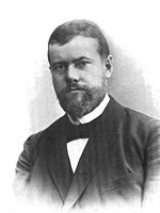
Max Weber
Overview
Sociology
Sociology is the study of society. It is a social science—a term with which it is sometimes synonymous—which uses various methods of empirical investigation and critical analysis to develop a body of knowledge about human social activity...
and political economist
Political economy
Political economy originally was the term for studying production, buying, and selling, and their relations with law, custom, and government, as well as with the distribution of national income and wealth, including through the budget process. Political economy originated in moral philosophy...
who profoundly influenced social theory
Social theory
Social theories are theoretical frameworks which are used to study and interpret social phenomena within a particular school of thought. An essential tool used by social scientists, theories relate to historical debates over the most valid and reliable methodologies , as well as the primacy of...
, social research
Social research
Social research refers to research conducted by social scientists. Social research methods may be divided into two broad categories:* Quantitative designs approach social phenomena through quantifiable evidence, and often rely on statistical analysis of many cases to create valid and reliable...
, and the discipline of sociology itself. He was a key proponent of methodological antipositivism
Antipositivism
Antipositivism is the view in social science that the social realm may not be subject to the same methods of investigation as the natural world; that academics must reject empiricism and the scientific method in the conduct of research...
, presenting sociology as a non-empiricist
Empiricism
Empiricism is a theory of knowledge that asserts that knowledge comes only or primarily via sensory experience. One of several views of epistemology, the study of human knowledge, along with rationalism, idealism and historicism, empiricism emphasizes the role of experience and evidence,...
field which must study social action through interpretive means
Verstehen
Verstehen is an ordinary German word with exactly the same meaning as the English word "understand". However, since the late 19th century in the context of German philosophy and social sciences, it has also been used in the special sense of "interpretive or participatory examination" of social...
based upon understanding the meanings and purposes that individuals attach to their own actions.
Unanswered Questions
Quotations
The Truth is the Truth.![]()
Last words, as quoted in Prophets of Yesterday : Studies in European Culture, 1890-1914 (1961) by Gerhard Masur, p. 201

